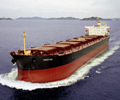Chinese Steel Export Ban Could Cut The Iron Ore Price And Hurt Australia

A ban on steel exports is one way China might achieve it’s aim of reducing the price of iron ore and delivering a fresh blow to its trade-war target, Australia.
The suggestion of a steel-export ban is contained in a research paper by UBS, an investment bank in a report headed: “How can China control commodity prices?”
The second possible move, according to the Swiss bank, is to sell surplus metals, including copper, aluminum and zinc held in China’s strategic reserves.
UBS published its commodity-price control proposals after last week’s spectacular rise and fall in the price of iron ore which hit an all-time record high of $233 a ton on Wednesday before dropping back to $205/t.
Over the past 12-months, as China has rapidly emerged from the slowdown triggered by the Covid-19 pandemic iron ore has more than doubled from $85/t.
Australia, which supplies an estimated 60% of China’s imported iron ore has been the major beneficiary of the price rise despite an intensifying war of words and trade bans applied by China on a range of agricultural products such as barley and seafood.
Rumors Of Reduced Australian Imports
A shortfall in Brazilian iron ore exports has applied extra pressure on the price which had been expected to fall this year but has surged higher, partly because Chinese steel mills have been building stockpiles of the material in case they are ordered to reduce purchases from Australia.
Another investment bank, Morgan Stanley said the catalyst for last week’s record high iron ore price was an announcement that China had suspended indefinitely all activities under the framework of the China-Australian Strategic Economic Dialogue.
However, after the surge up to $233/t market opinion turned when the Chinese Government raised its concerns about the rapid rise in commodity prices.
UBS said a ban, or severely restricted steel exports, would achieve two Chinese Government objectives. It would lower domestic steel prices and the price of imported iron ore.
Strong Steel Demand
“China steel demand is strong and inventories are following seasonal patterns but in our view China steel prices are being pulled up by record international steel prices and export premiums,” UBS said.
The bank said that in April, Chinese finished steel exports rose to the highest level since 2016, adding that high steel prices had incentivized record steel output despite restrictions in Tangshan and, in turn, strong demand for iron ore.
“In China banned steel exports it would increase supply to the domestic market, pushing prices down and reducing inflationary pressures,” UBS said.
The bank did not name Australia in its suggestions for steel exports and reduced iron ore demand but it didn’t have to because of the dominant position Australia has an iron ore supplier and the potential appeal of ratcheting up pressure on its trade target.
On the sale of surplus metal held by the State Reserves Bureau UBS said that aluminium prices dipped in March when it was first suggested that a sale could be made.
“Aluminum and copper prices are now 10%-to-15% higher so the risk of selling is lifting,” UBS said.
However, the bank said it saw limited signs of tightness in the Chinese metal market and in the past this had been a reason for the SRB to sell some of its reserves.
“But, if inflationary pressures continue to rise, SRB sales are an option that would lift supply and likely reduce speculation,” the bank said.
Source: Forbes

 Hellenic Shipping News Worldwide Hellenic Shipping News Worldwide, Online Daily Newspaper on Hellenic and International Shipping
Hellenic Shipping News Worldwide Hellenic Shipping News Worldwide, Online Daily Newspaper on Hellenic and International Shipping























 PG-Software
PG-Software